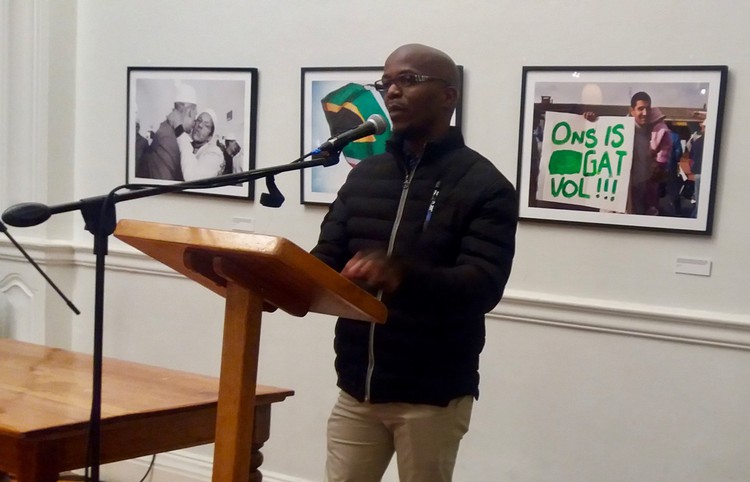
Victor Chikalogwe speaking at the Colours of Cape Town event convened by PASSOP for solidarity between the gay and immigrant communities. Photo: Tariro Washinyira
28 July 2017
Shamsa Ally Haji is an immigrant from Somalia. She is also lesbian. “It’s difficult for me to go to other Somali nationals to ask for help because they believe I should behave like a Somali woman and get married. They detest my dressing in jeans,” she said.
She was speaking at Colours of Cape Town, a night of solidarity between Cape Town’s LGBTI and immigrant community. It was hosted on Wednesday by PASSOP (People Against Suffering, Oppression and Poverty) at 6 Spin Street. The event was attended by various organisations, including Free Sexual Health One Stop, Inner Circle, Pride Shelter, Enhanced Care Foundation and Pride Yarona.
Victor Chikalogwe, who is the programme coordinator for PASSOP, said that he left Malawi when his parents disowned him because of his sexuality. Fortunately, he had enough savings, but seeing how LGBTI immigrants struggle, he went into activism. His parents have at last accepted him back.
Sharon Cox, Health and Support Services Manager at Triangle Project and Albie Sachs, former judge of the Constitutional Court, were keynote speakers.
Cox said recent research by the Human Sciences Research Council found that 72% of South Africans believe that same-sex relationships are morally wrong. From this, she said, “We then can deduce that somewhere in the region of 72% of our police officers, 72% of our teachers, 72% of our prosecutors, 72% of our doctors and nurses, 72% of our politicians hold this view. If we add to those numbers the Afrophobia that exists in this city – we then see the intersections ….race, class, ethnicity, gender expression and orientation amongst them.”
In his address, Sachs said that before apartheid ended, the ANC had already included gay rights. “Zanele Mbeki who led the ANC women’s section at the time organised a conference in Lusaka, and [we] took the decision as an organisation, which says no discrimination on grounds of sexual orientation. The South African constitution today is the only one in the world that expressly prohibits discrimination on basis of sexual orientation.” [Sachs apparently did not mention that the ANC in government opposed, ultimately unsuccessfully, various court cases that had to be brought to remove discrimination against LGBTI people, and that he was responsible for a Constitutional Court judgment that delayed the introduction of same-sex marriage by a year. - Editor]
“We have then had a number of cases in the Constitutional Court, starting with a decision to say that to send people to jail for the so-called crime of sodomy was a gross violation of the rights to dignity, perception, and equality. Well known cases of gay men and women marriages were also heard in the courts. The law is very clear in our country,” Sachs said. “Sadly, there are terrible episodes in certain places of the townships where lesbian women are subjected to very cruel and gross forms of violence. But nevertheless we have made huge progress generally.”
Sachs said he had been a refugee twice, spending eleven years in Mozambique, and eleven years in England.
He said people died in the frontline states (Angola, Botswana, Mozambique, Tanzania, Zambia, and Zimbabwe) for South Africans to get their freedoms. The economies were also destroyed. “Many African countries paid a huge price for us to get our freedom. Our refugee law in South Africa is very good. We turned away from the idea of setting camps outside borders which is a common thing in many African countries. Refugees have got a right to work and enjoy economic freedom.”